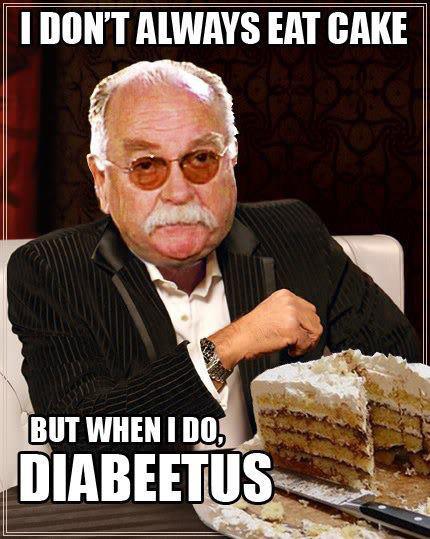sugar is toxic
Replies
-
*humming Sugar by SOAD*0
-
As with most things, three words often overlooked in pseudoscience and scaremongering apply: Context. And. Dosage.Sugar is not toxic. It's certainly not good for you in large quantities, but it's nothing to really worry much about.
Water is essential for our survival; however, in excessive quantities it can cause hyponatremia, which can lead to death. Does that mean we should avoid water, or should we instead consider context and dosage and consume it in appropriate quantities?0 -
You should read this article by Mark Bittman on the New York Times: http://opinionator.blogs.nytimes.com/2013/02/27/its-the-sugar-folks/?src=me&ref=general
("It's the sugar, folks!")
It references the study that came out that said sugar acts as a toxin in our bodies.
I do believe there is value in severely limiting processed sugars and have been working to do that myself. But I am concerned about whole health and not just losing weight by hitting my daily calorie goal. Does that mean that I'll never have ice cream again? No, but I'm far more conscious about the added sugar that appears in processed foods.0 -
*humming Sugar by SOAD*
Weren't you just saying you were going to bring some science to this thread?
*waiting*0 -

This is exactly what I was thinking. :laugh:
Could not have been any more perfect.0 -
As with most things, three words often overlooked in pseudoscience and scaremongering apply: Context. And. Dosage.Sugar is not toxic. It's certainly not good for you in large quantities, but it's nothing to really worry much about.
Water is essential for our survival; however, in excessive quantities it can cause hyponatremia, which can lead to death. Does that mean we should avoid water, or should we instead consider context and dosage and consume it in appropriate quantities?
Dude! Your making way to much sense here with like logic and *kitten*. That can't be right.0 -

This is exactly what I was thinking. :laugh:
Could not have been any more perfect.
Oh Noos I'm gonna die from that carrot cake I ate tonight!!!!0 -

This is exactly what I was thinking. :laugh:
Could not have been any more perfect.
Oh Noos I'm gonna die from that carrot cake I ate tonight!!!! 0
0 -
As with most things, three words often overlooked in pseudoscience and scaremongering apply: Context. And. Dosage.Sugar is not toxic. It's certainly not good for you in large quantities, but it's nothing to really worry much about.
Water is essential for our survival; however, in excessive quantities it can cause hyponatremia, which can lead to death. Does that mean we should avoid water, or should we instead consider context and dosage and consume it in appropriate quantities?
Dude! Your making way to much sense here with like logic and *kitten*. That can't be right.
I am with you on that one!0 -
Nice big tl/dr post but here's the deal. You are wrong right out of the box so, the rest of your post based on this premise is BS. Insulin DOEs NOT produce fat. Insulin is nothing but a shuttling hormone. In a energy (calorie) surplus, it shuttles energy to fat. In a calorie deficit it shuttles energy to where it's needed in the body. Nothing trumps the energy balance equation (in those without other health and metabolic issues).Google "Nancy Appleton". She goes over why sugar is bad for you and how it manifests itself in various health problems we have today. To give you a simple explanation of what happens in the body...
Insulin: A metabolic hormone with many vital functions. One of them is producing and storing body fat from excess carbohydrates.
Insulin is a hormone. It produces nothing. It is amoral. It just does it's job. If we overeat, whether it's sugar or anything else, insulin will shuttle the excess energy to storage. It's the overeating that is the issue. Stop trying to demonize a simple hormone that has been just doing it's job for thousands of years.
http://weightology.net/weightologyweekly/?page_id=3190 -
*humming Sugar by SOAD*
Love. So much love.0 -

What? No bananas?! Those are what made me fat. I'm sure of it.0 -
No sugar? Eff that. Because cupcakes.
This is why I love MFP.
Yep.0 -
Well, duh. Of course it's bad for you. That's why I only eat things sweetened with honey, or maple syrup, or high fructose corn syrup.0
-
:laugh: :laugh: :laugh: :laugh:You know what else is toxic?
Poison. True story.0 -
As with most things, three words often overlooked in pseudoscience and scaremongering apply: Context. And. Dosage.Sugar is not toxic. It's certainly not good for you in large quantities, but it's nothing to really worry much about.
Water is essential for our survival; however, in excessive quantities it can cause hyponatremia, which can lead to death. Does that mean we should avoid water, or should we instead consider context and dosage and consume it in appropriate quantities?
WHAT????????????????? mfp have me drinking like ten glasses a day!! this are horrible!!! how is this website even legal?0 -
So is dihydrogenmonoxide but they put that **** in everything
That is the #1 cause of drowning! Crazy that people use it everyday.0 -
how do I delete the comments that arent serious?
:laugh: :laugh: :laugh: welcome to public forums!! :laugh: :laugh:0 -
Google "Nancy Appleton". She goes over why sugar is bad for you and how it manifests itself in various health problems we have today. To give you a simple explanation of what happens in the body...
Insulin: A metabolic hormone with many vital functions. One of them is producing and storing body fat from excess carbohydrates.
Glucagon: Another metabolic hormone, with opposing functions to Insulin. Glucagon unlocks fat storages and releases fat for energy purposes.
Insulin and Glucagon are opposing paired hormones. This means that when one goes up the other goes down. They are the master controllers of metabolism and serve opposite functions.
In a simple study, researchers injected a group of rats with Insulin and another group with Glucagon. The group that received Insulin gained body fat. The group that received Glucagon lost body fat.
The Insulin/Glucagon ratio is the key for health, body composition, mental productivity and energy levels.
Your body is an energy machine, never resting, always metabolically active, and it powers its operations mainly using Glucose (a basic form of sugar). In the body, all carbohydrates finally break down to Glucose (blood sugar). The body must have the Glucose and even in starvation, it is able to convert other substances (fat and muscle) to Glucose, to maintain its normal level.
When you eat any carbohydrates, they break down to sugars and finally to Glucose. The Glucose rushes into your blood quickly; in other words, your blood sugar level will rise sharply. Your body makes an instant decision of how much of that pure energy goes for immediate needs and how much will it store. The tool of this decision is Insulin, which regulates the processing of blood sugar. A small amount of carbohydrate intake generates a small Insulin response. A large amount of carbohydrate intake generates a large Insulin response.
Insulin does three things to blood sugar:
1. Transports one part of blood sugar to the cells to take care of immediate energy demand. This is a bypass of your own energy production system.
2. Stores another part of blood sugar in carbo-storages in the muscles and liver.
3. Converts the leftover blood sugar to fat and stores it as BODY FAT.
Insulin is also a fat storage and locking hormone. In other words, it makes you fat and it keeps you fat.
Glucagon serves the opposite functions of Insulin. Just as Insulin is a fat storage and locking hormone, Glucagon is an unlocking and fat burning hormone.
You want to raise Glucagon levels and lower Insulin levels if you want to be healthy and have a healthy body weight. Glucagon aims to correct imbalances that create body fat storage and blocks fat burning.
Carbohydrates trigger Insulin (fat storage).
Proteins trigger Glucagon (fat burning).
Fats (and Oils) do not have an effect on either Insulin or Glucagon when they are consumed alone.
When you shift your metabolic system to fat burning, your body produces its own energy instead of being bypassed by sugars. That IS your metabolism at work.
Proteins and fats also have insulinogenic effects, but to a lesser degree than carbohydrates. Believe me - as someone who has taken exogenous insulin for over 2 decades to control type 1 diabetes I can tell you that protein WILL raise blood glucose levels - some of it is converted by the body to glucose. Depending on the person, up to 40% of the protein consumed can result in an insulinogenic effect. In addition, fat has a small insulinogenic effect - up to a maximum of 10% can be converted to glucose by the body. This is why many people using exogenous insulin follow the TAG (total available glucose) approach to determining insulin needs. It is NOT based purely on carbs.0 -
Sugar isn't just a source of empty calories, responsible for obesity and Type 2 diabetes, in this scenario: at high quantities, it is a full-fledged toxicant and contributes to many of the major fatal non-communicable conditions, like cardiovascular disease and cancer.
there's a video on YouTube called "Sugar: The Bitter Truth"
I would watch that if I were you.0 -
http://www.huffingtonpost.com/2012/02/02/sugar-toxic-regulation_n_1248397.html
Some people are considering regulating it like alcohol. according to this article.0 -
Context. And. Dosage.Sugar isn't just a source of empty calories, responsible for obesity and Type 2 diabetes, in this scenario: at high quantities, it is a full-fledged toxicant and contributes to many of the major fatal non-communicable conditions, like cardiovascular disease and cancer...0 -
As with most things, three words often overlooked in pseudoscience and scaremongering apply: Context. And. Dosage.Sugar is not toxic. It's certainly not good for you in large quantities, but it's nothing to really worry much about.
Water is essential for our survival; however, in excessive quantities it can cause hyponatremia, which can lead to death. Does that mean we should avoid water, or should we instead consider context and dosage and consume it in appropriate quantities?
Dude! Your making way to much sense here with like logic and *kitten*. That can't be right.
Quiet down! ... I want more gifs.0 -
how do I delete the comments that arent serious?
You can pray really hard. Besides that, not much.
Seriously, no toxins come from sugar. Your body processes glucose directly. Glucose is the starting point for glycolysis, the first part of the process by which your body generates energy.
The human body is extraordinarily good at turning glucose directly into pyruvate, or storing it as glycogen. Don't worry about sugar being toxic. It's not. It can cause undesirable hormonal levels and contribute to fat storage in large quantities, but it's definitely not toxic in any way shape or form.
wrong. sugar is half glucose half fructose. fructose is ****ed and is a chronic hepatoxin or something like that. glucose good fructose bad.0 -
As with most things, three words often overlooked in pseudoscience and scaremongering apply: Context. And. Dosage.Sugar is not toxic. It's certainly not good for you in large quantities, but it's nothing to really worry much about.
Water is essential for our survival; however, in excessive quantities it can cause hyponatremia, which can lead to death. Does that mean we should avoid water, or should we instead consider context and dosage and consume it in appropriate quantities?
Dude! Your making way to much sense here with like logic and *kitten*. That can't be right.
Quiet down! ... I want more gifs.
Lolz!0 -
how do I delete the comments that arent serious?
You can pray really hard. Besides that, not much.
Seriously, no toxins come from sugar. Your body processes glucose directly. Glucose is the starting point for glycolysis, the first part of the process by which your body generates energy.
The human body is extraordinarily good at turning glucose directly into pyruvate, or storing it as glycogen. Don't worry about sugar being toxic. It's not. It can cause undesirable hormonal levels and contribute to fat storage in large quantities, but it's definitely not toxic in any way shape or form.
wrong. sugar is half glucose half fructose. fructose is ****ed and is a chronic hepatoxin or something like that. glucose good fructose bad.
Yeah or something like that. Double lolz!!0 -
how do I delete the comments that arent serious?
You can pray really hard. Besides that, not much.
Seriously, no toxins come from sugar. Your body processes glucose directly. Glucose is the starting point for glycolysis, the first part of the process by which your body generates energy.
The human body is extraordinarily good at turning glucose directly into pyruvate, or storing it as glycogen. Don't worry about sugar being toxic. It's not. It can cause undesirable hormonal levels and contribute to fat storage in large quantities, but it's definitely not toxic in any way shape or form.
wrong. sugar is half glucose half fructose. fructose is ****ed and is a chronic hepatoxin or something like that. glucose good fructose bad.
Ummmm...would you like to be a bit more specific.0 -
As with most things, three words often overlooked in pseudoscience and scaremongering apply: Context. And. Dosage.Sugar is not toxic. It's certainly not good for you in large quantities, but it's nothing to really worry much about.
Water is essential for our survival; however, in excessive quantities it can cause hyponatremia, which can lead to death. Does that mean we should avoid water, or should we instead consider context and dosage and consume it in appropriate quantities?
Dude! Your making way to much sense here with like logic and *kitten*. That can't be right.
Quiet down! ... I want more gifs. 0
0 -
Fat, and fat is the sole cause of heart disease...
Other than genetics and lack of exercise?0 -
Wait, I srsly don't give much **** cos I gave up white sugar years ago and i lack sweet tooth syndrome..but..isnt fructose the sugar from fruits? Do correct me if I am wrong, I admit my ignorance in this subject but if I will hear that apples can give me cancer I might flip :P
I lived in this ideal dream of "context and dosage" wisdom.
Gosh, lets not outlaw fruits now.
This thread did break my sarcasm meter repediately tho, so I might be geting trolled now. Again, Ignorance is my line of defense 0
0
This discussion has been closed.
Categories
- All Categories
- 1.4M Health, Wellness and Goals
- 398.2K Introduce Yourself
- 44.7K Getting Started
- 261K Health and Weight Loss
- 176.4K Food and Nutrition
- 47.7K Recipes
- 233K Fitness and Exercise
- 462 Sleep, Mindfulness and Overall Wellness
- 6.5K Goal: Maintaining Weight
- 8.7K Goal: Gaining Weight and Body Building
- 153.5K Motivation and Support
- 8.4K Challenges
- 1.4K Debate Club
- 96.5K Chit-Chat
- 2.6K Fun and Games
- 4.8K MyFitnessPal Information
- 13 News and Announcements
- 21 MyFitnessPal Academy
- 1.6K Feature Suggestions and Ideas
- 3.2K MyFitnessPal Tech Support Questions

















